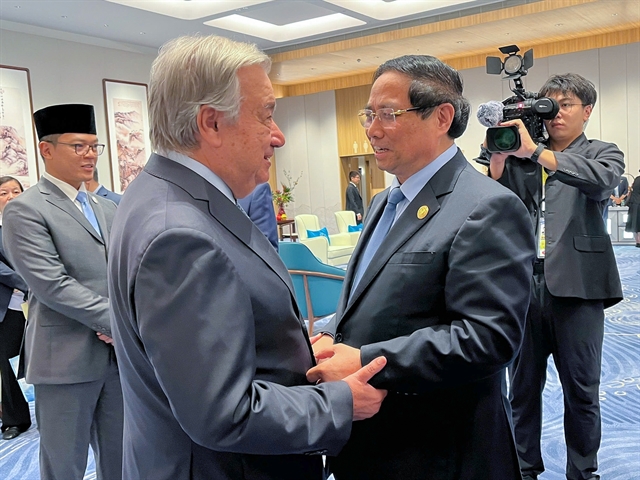 Politics & Law
Politics & Law


|
| Prime Minister Phạm Minh Chính meets United Nations Secretary-General Antonio Guterres in Tianjin, China. — Photo courtesy of the Việt Nam Government Portal (VGP) |
HÀ NỘI — On the sidelines of the Shanghai Cooperation Organisation (SCO) Summit 2025 in Tianjin, Prime Minister Phạm Minh Chính on Monday held meetings with United Nations Secretary-General Antonio Guterres, and ASEAN Secretary-General Kao Kim Hourn, as well as his Cambodian, Malaysian and Indian counterparts.
At his meeting with UN Secretary-General Antonio Guterres, PM Chính reiterated Việt Nam’s strong commitment to multilateralism and a rules-based international order under the UN Charter, while also underscoring the country’s commitment to climate response obligations.
The Vietnamese Government leader called for UN support for ASEAN’s central role in the regional structure and further strengthening of UN–ASEAN cooperation.
He also invited the UN Secretary-General to Hà Nội in October this year for the signing ceremony of the UN cybercrime convention (Hanoi Convention).
Discussing current global challenges, UN Secretary-General Guterres stressed the need for stronger international cooperation in addressing climate change, and emphasised UN reform to streamline operations and improve effectiveness.
In talks with ASEAN Secretary-General Kao Kim Hourn, PM Chính highlighted Việt Nam’s determination to work with the bloc’s member states to realise the ASEAN Community Vision 2045.
He expressed confidence that under Secretary-General Kao’s leadership, the ASEAN Secretariat would continue to effectively support Việt Nam and other members in optimising the benefits of integration.
They also agreed to prioritise maintaining ASEAN’s solidarity and unity, boosting intra-regional trade and investment, tapping new growth drivers, enhancing people-centered cooperation, promoting subregional development, while also expanding infrastructure, transport, institutional, and human connectivity, particularly in remote and underdeveloped areas, to foster inclusive and balanced growth.
During his meeting with his Cambodian counterpart Hun Manet, PM Chính thanked Cambodian People’s Party President and Senate President Hun Sen for attending Việt Nam’s grand celebration of the 80th anniversary of the August Revolution (August 19, 1945-2025) and National Day (September 2, 1945-2025), which he said reflecting the close bonds and solidarity between the two nations.
He proposed that the two sides continue strengthening political trust, enhancing bilateral cooperation mechanisms, and facilitating investment and business activities by companies from both countries. Their goal is to reach US$20 billion in trade turnover in the near future.
PM Chính also highlighted Việt Nam’s commitment for boosting transport connectivity, simplifying cross-border transport procedures, and strengthening tourism cooperation.
Both leaders agreed to accelerate the completion of land border demarcation, the Phnom Penh–Bavet Expressway, and inaugurate the Tân Nam–Meun Chey Border Gate. They also exchanging views on regional and global issues of mutual concern.
At his meeting with Malaysian PM Ibrahim Anwar, PM Chính praised Malaysia’s efforts as ASEAN Chair in addressing regional issues, thereby contributing to strengthening solidarity and enhancing ASEAN’s reputation and central role.
The Vietnamese leader also encouraged bilateral cooperation in the halal industry, rice trade, and maritime cooperation.
Both sides agreed on measures to enhance cooperation, including early adoption of the Action Programme to implement the Việt Nam–Malaysia Comprehensive Strategic Partnership for 2025–2030, and to promote cooperation in defence, energy, tourism, and people-to-people exchanges.
During talks with Indian PM Narendra Modi, the two leaders expressed satisfaction with the robust development of the Việt Nam–India Comprehensive Strategic Partnership, stressing that there remains considerable potential to further deepen and expand cooperation.
They agreed on the need for breakthroughs in economic, trade and investment cooperation, making the most of the geo-economic advantages and market potential of both countries.
The two PM also agreed to elevating defence and security cooperation as a strategic focus, in addition to science and technology cooperation as a key pillar in bilateral relations. — VNS